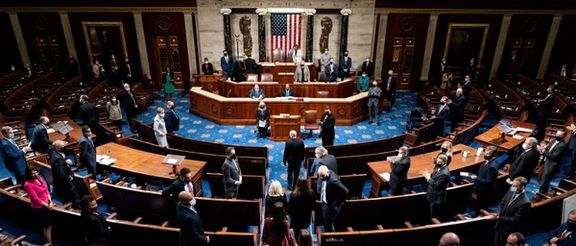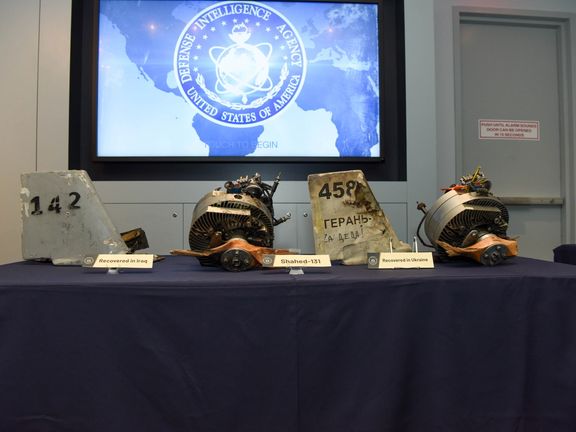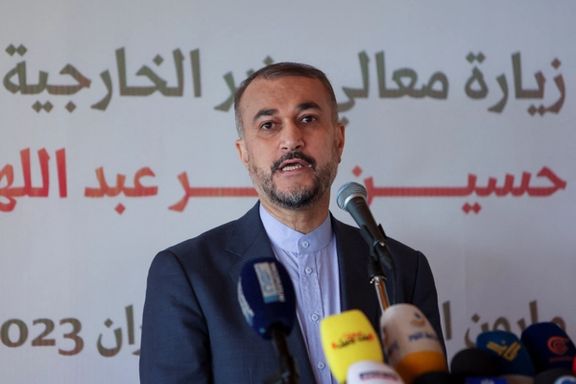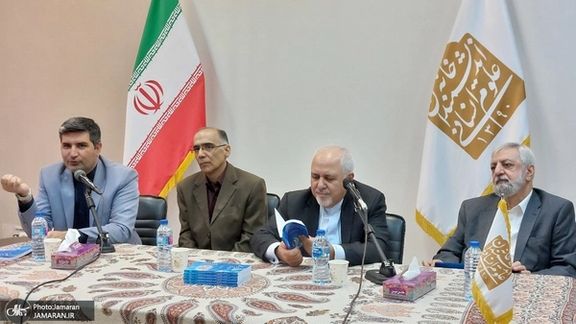Iran’s Mahsa Amini Finalist For EU’s Top Human Rights Prize

The European Parliament Thursday announced the finalists for this year’s prestigious Sakharov Prize that includes Mahsa Amini and the Woman Life Freedom Movement in Iran.

The European Parliament Thursday announced the finalists for this year’s prestigious Sakharov Prize that includes Mahsa Amini and the Woman Life Freedom Movement in Iran.
Last year, the death of Mahsa Amini, the 22-year-old Kurdish-Iranian woman while in police custody for improper attire, sparked one of the most widespread anti-government protests across the country. The crackdown on protests resulted in hundreds of deaths and thousands of arrests by authorities, according to human rights organizations.
The Woman Life Freedom Movement has gained international attention in support of Iranian women who have been enduring decades of oppression and enforced hijab by the Islamic Republic’s regime since 1979.
The Sakharov Prize is awarded each year by the European Parliament since 1988 to honor individuals and organizations that defend human rights and basic freedoms. The winning laureates for 2023 selected by the European Parliament will receive the prize in a ceremony in December in Strasbourg.
Previous recipients of the prize include Nelson Mandela and Malala Yousafzai, who also won the Nobel Peace Prize.
The shortlist is the latest show of recognition of the plight of Iranian women by the international community. Last week, jailed activist Narges Mohammadi was awarded the 2023 Nobel Peace Prize for what the committee called “her fight against the oppression of women in Iran and her fight to promote human rights and freedom for all.”
Meanwhile, days after the one-year anniversary of Mahsa Amini’s death in September, Iranian parliament passed a chastity and hijab bill to impose heavier penalties on women who do not follow the compulsory Islamic dress code.

More than 100 House Republicans have backed a bill to refreeze the $6 billion in Iranian oil revenue that was released last month as part of a prisoner swap deal.
The deal had many opponents among the Republicans from the onset. Some called it ‘ransom’ and warned that the regime in Iran may use it against US interests. But the Biden administration maintained that the funds were watched closely and could only be used for humanitarian purposes.
Once Hamas, a group supported by Iran, launched a terror attack on Israel, the opponents of the deal felt vindicated and took direct action.
“A month ago… the Biden Administration unfroze $6 billion and made it available to Iran,” said Congressman August Pfluger who introduced a bill to block Iran’s access to the fund. “This $6 billion will be used to backfill the money that Iran is paying to Hamas if we don’t act. Since the Administration refuses to permanently freeze the funds, Congress will.”
One day earlier, Treasury Secretary Janet Yellen had hinted that the funds could be frozen once more. John Kirby, spokesperson for the US National Security Council, did also suggest that the funds “can be re-frozen” at any time.
But neither statement satisfied the Republicans, it seems. They wanted an immediate and permanent ‘refreeze’.
Section 2 of the bill reads, “notwithstanding any other provision of law, on and after the date of the enactment of this Act, the President may not exercise the waiver authority…”
It’s not clear when this bill would be put to a vote. Republican Study Committee Chairman Kevin Hern who co-leads the bill with Rep. Pfluger said in a statement he will “work to get a vote on the House floor as soon as possible.”
The bill and the demands made by Republican senators highlight the deep divisions in Washington on Iran policy in general and the fate of the $6 billion, in particular.
With the 2024 election campaign well under way, President Biden may find it hard to devise a new policy, let alone implement it. He has been chasing some form of agreement with the Islamic Republic in the hope that it would curb the regime’s nuclear ambitions. But the Republicans may very well turn any such agreement into an attack line against the backdrop of the Hamas attack in Israel.
The Pfluger/Hern bill has wide support in the House and can be expected to pass. It will add to the pressure on Biden and his administration to refreeze the $6 billion fund even before the bill is enacted into law. The issue is that no one knows exactly what kind of a deal the administration has with Qatar over the money.
The Washington Post reported Thursday that a senior official from the US Treasury has informed House Democrats that the US and Qatar have agreed to deny Iran the use of the $6 billion fund even for non-sanctionable goods.
The unfrozen $6 billion was transferred from two South Korean banks to a Qatari bank with the State Department’s greenlight.
Asked about the Washington Post report, Secretary of State Antony Blinken, avoided a direct response. “We have strict oversight on the funds, and we retain the right to freeze them,” he said.
Iranian officials are yet to react to the movements in Washington aimed at refreezing the unfrozen fund.

Officials from the US military showed what they said were pieces of Iranians drones found in Ukraine to United Nations member states on Thursday.
The event was held by the United States Defence Intelligence Agency (DIA) and attended by representatives from more than 40 countries, said the US mission to the UN.
On display were debris including parts of Iranian drones Shahed 101, 131, and 136 that were used by Russia to attack Ukraine since October 2022. The exhibition provides evidence of strengthening ties between the Islamic Republic and Moscow, according to the Pentagon.
“These are not replicas. These are the real thing,” said Linda Thomas-Greenfield, US Representative to the UN in her remarks.
“These are the weapons of war that Iran has transferred to malign actors in violation of Resolution 2231 that are being used to decimate civilians and critical infrastructure,” Thomas-Greenfield added.
US defence officials previously displayed pieces of Iranian drones recovered in Ukraine in Washington in August.
Despite evidence, Tehran has been denying its supply of drones to Russia on numerous occasions. The US and the European Union have slapped Iran with sanctions concerning its supply of drones to Russia.
Britain also took part in the event at the US mission to the UN, with officials also showing evidence of what they said were missiles and components with Iranian markings and serial numbers.
“Iran’s transfer of these drones is a grave threat to international peace and security,” said Thomas-Greenfield at the event.
“And it’s going to take all of us, working together, to ensure the international community does the right thing and continues to hold Iran to account,” she added.

An Iranian website closely linked to the country’s security council said on Friday that “no change” has occurred in the status of Iranian funds in Qatar.
Noor News, affiliated with the Supreme National Security Council of the Islamic Republic said in a brief note that despite media reports “No change has occurred in Iran's access to its foreign exchange resources in Qatari banks, and the agreement remains in force."
US media reported Thursday that the Biden administration and the Qatari government have agreed to stop Iran from accessing $6 billion in released funds, on deposit in Qatari banks, for humanitarian purchases.
The Washington Post reported that US Deputy Treasury Secretary Wally Adeyemo has told House Democrats that after the October 7 bloody Hamas attack on Israel and the death of more than 1,000 civilians, the US and Qatar reached the deal to deny Iran the use of the funds for buying non-sanctionable goods. CBS News called it a "quiet understanding", not a formal agreement.
The Biden administration reached a hostage release deal in August to allow South Korea to unblock $6 billion of Iranian funds and transfer to Qatar in exchange for the release of five Americans held by Iran. Critics slammed the deal, labeling it as “the biggest ransom payout in history”, which would embolden the Iranian regime and encourage hostage taking around the world.
The Biden administration has not confirmed the news about a deal with Qatar to withhold the funds. Asked about the reports, US Secretary of State Antony Blinken said,. “None of the funds that now have gone to Qatar have actually been spent or accessed in any way by Iran,” dodging a direct answer.

Iran's Foreign Minister Hossein Amir-Abdollahian said on Thursday that the continuation of crimes against Palestinians will receive a response from "the rest of the axis."
Amir-Abdollahian was speaking in Beirut on Thursday on a tour of Iraq, Lebanon and Syria. He was received at the airport by top officials of Hamas, Islamic Jihad and Hezbollah.
Israel has been pounding Gaza in retaliation for a Hamas rampage in Israel this week that has killed at least 1,300 people, the deadliest attack on civilians in Israeli history. More than 1,500 Palestinians have been killed.
The Iranian minister said the displacement of Palestinians and cutting water and electricity to the Gaza Strip are considered war crimes.
"Some Western officials have questioned if there is an intention to open a new front against the Zionist entity. Of course, in light of the continuation of these circumstances that are war crimes," he said, speaking through a translator, on television upon his arrival in Beirut.
"The continuation of war crimes against Palestine and Gaza will receive a response from the rest of the axis. And naturally, the Zionist entity and its supporters will be responsible for the consequences of that," Amir-Abdollahian said.
Western governments and media are also questioning Iran’s role in the Hamas attack and its long-standing financial and military support for militant groups in the region. The Iranian foreign minister’s remarks push Tehran further to the forefront of the conflict.
‘Axis of Resistance’ is a term coined by the Islamic Republic to refer to its proxy forces in the region including, Palestinian militant groups, the Syrian regime, the Lebanese militant group Hezbollah and other factions.

While no Iranian official dares to speak out against the Hamas attack on Israel, some go beyond praise with hints of flattery for the Supreme Leader’s political sleight of hand.
As all media are meant to echo the official stance of Ali Khamenei, Iran’s former Foreign Minister Javad Zarif, the architect of Tehran’s nuclear deal with the world and the mastermind behind the regime’s lobbying network abroad, hailed not only Hamas but also Khamenei for the regime's stance to distance itself from the Hamas massacre now shocking the world.
During an event to unveil his latest book, Zarif said, “Israel needs to create both internal and external adversaries for its survival,” tacitly referring to statements that implicated the regime in the Hamas multi-thronged attack on Israeli cities, which has killed over 1,300 Israelis and injured thousands more.
“Israel seeks to portray Iran as a threat. I am very pleased that our Supreme Leader disrupted the Israeli plot in his Tuesday speech. This was a necessity for Iran's national security," Zarif added. On Tuesday, Khamenei strategically changed his view about Iran's involvement in the Hamas terror attack in comparison to his earlier statement.
Earlier, Khamenei had said, "We intervened due to our enmity with Israel and the result was the victory in the 33-day and 22-day wars. We will help any group that would fight Israel." But his opinion was different on Tuesday after being cautioned and warned by US officials: "Islamic Iran is being named as the country behind this move [by Hamas]. But they make a mistake. This was done by Palestinians themselves."

Expressing any opinion on the Israeli-Palestinian conflict in Iran is a risky endeavor, as all officials and politicians must meticulously align themselves with Khamenei’s subtle nuances. In Iran, once Khamenei dictates the regime's policy themes concerning global developments, other officials, clerics, and his representatives across the country begin to disseminate them.
No matter the changes in Khamenei’s rhetoric or tone, the regime's position remains inherently contradictory. It applauds Hamas's bloody attack as a victory in their wish to uproot Israel, takes pride in its years of support for the Gaza-ruling terrorist group, and pledges further assistance, all while maintaining Iran's non-involvement.
After Khamenei sets the tone and direction, much of the saber-rattling is automatically delegated to his men installed in all the country’s organizations and governing bodies. His representative in the Revolutionary Guards, Abdollah Hajisadeghi, said Thursday that Israel "lacks the capability to confront the resistance front." The ‘resistance’ is the term the Islamic Republic regime calls its logistic, financial and intelligence support for the militia groups in the region, several of which were created by Iran.
He added that Iran must deliver this message to Israel with a resounding voice: "Until your complete annihilation, the Islamic Revolution and the Resistance front will never rest."
Khamenei’s chief of staff, Mohammad Mohammadi Golpayegani, said, "The Israeli prime minister said the head of the snake is in Iran; this is not the head of the snake, it is the staff of Moses, and it’ll swallow and destroy all snakes.” According to Biblical and Quranic stories, the Moses’ staff became a serpent and swallowed up all other staffs that had also been transformed into snakes by Pharaoh’s sorcerers.
Iran’s Foreign Minister Hossein Amir-Abdollahian, who is in Iraq on the first leg of his tour of the region to discuss the conflict, said Thursday "The Islamic Republic's stance on Palestine is unequivocal, and we have consistently supported the rights of Palestinian Muslims. However, what happened during the Operation Al-Aqsa Storm was an entirely Palestinian, self-driven reaction to the continued offenses and provocations committed by the Zionists against the Palestinian people.”
President Raisi also reiterated Thursday that Iran defends Palestine and “takes pride in defending their rights." He again congratulated Hamas on its “significant victories” in recent days.
Senior Hamas official Ali Baraka said in an interview with a Russian channel earlier in the week that “Hamas had been secretly planning the invasion of southern Israel for two years, even as it was making it seem like it was busy governing the Gaza Strip.” During all this time, Iran had been providing Hamas with military training, financial and arms support, and intelligence.